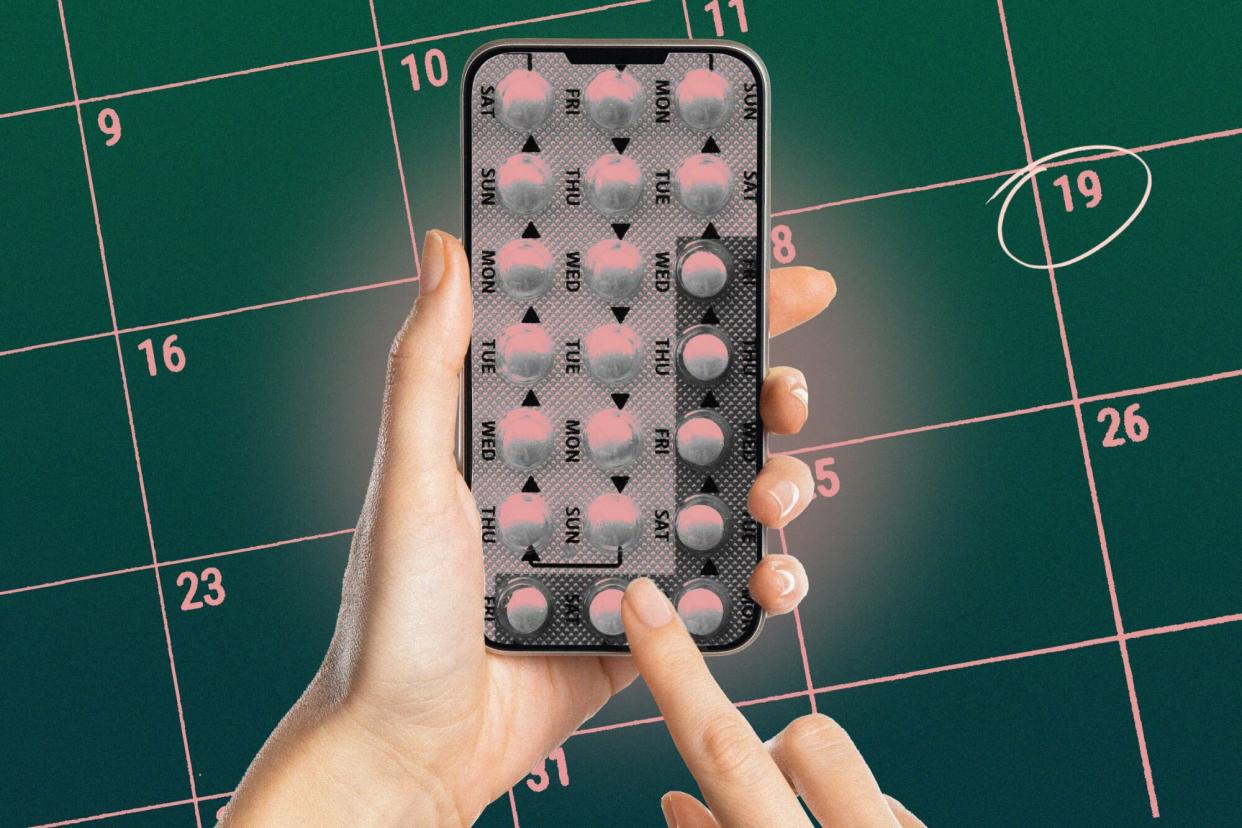Real Talk About Period Apps Post-Roe

Getty Images/ Amanda Lauro
I've been thinking a lot lately about the bizarre moment in history that we currently find ourselves in: We're moving backward in so many ways in terms of our civil rights, but the technology around us is speeding in the opposite direction. Pre-1973, when the Supreme Court legalized the right to abortion in the Roe v. Wade decision, there were no smartphones, no Google Maps, no iMessage, no period trackers. The odds that someone would be prosecuted for seeking an abortion did not rest on their browser history.
But today, that is possible. In the wake of the Supreme Court ruling overturning Roe v. Wade, there were lots of calls on social media for people to delete their period tracker apps — the idea being that if someone lived in a state that had passed restrictive abortion laws, their period apps could be used against them by prosecutors eager to find digital clues that would suggest they'd had an abortion. In response, one of the biggest period trackers, Clue, based in Europe, has come out and said they will not comply with requests for data from the U.S. Another popular app, Flo, introduced an anonymous mode, allowing people to use the app without any personally identifiable information.
RELATED: I'm an Ob-Gyn, And We Won't Go Back to the "Back Alley" Days Before Roe
Still, just last week the White House came out with a warning to be "really careful" when using phone apps that track users' menstrual cycles over fears that the data could be used against them if they seek abortions, although they stopped short of directing people to stop using them entirely. Privacy experts like the Electronic Frontier Foundation agree you don't necessarily have to rush to delete your apps — but you should educate yourself on which apps are protecting your privacy, and perhaps more importantly, on digital privacy in general.
That's because the problem is just deleting period or fertility apps is not enough to maintain digital privacy around the need for an abortion — your texts and Google search history can also be used by prosecutors as evidence, too. And this isn't just conjecture: In Mississippi in 2017, a woman who had a stillborn baby at 35 weeks was charged with "killing her infant child" after police found searches for "buy Misopristol Abortion Pill Online" on her phone — even though there was never evidence that she had actually taken them.
RELATED: How Fashion Brands Are Standing Up for Reproductive Rights
Luckily, there are a few steps you can take to keep yourself (and your data) safe.
First, says Cynthia Conti-Cook, a tech fellow at the Ford Foundation whose work has focused on surveillance and the intersection of technology and social justice, "don't voluntarily hand your phone over to anyone for anything. It's really important for everyone to know that when you are in an interaction — not only with police officers, but with social workers, caseworkers, probation officers, parole officers — to the extent possible if you can say no, you should say no, and hand your device over to an attorney or someone else who is involved in your representation in that case."
That's because once the authorities have your phone, they can pull all kinds of digital forensics from it, including your communication, search history, location history, photos, and anything you've posted on social networks. "These tools are a primary way the state attempts to gather evidence to imbue or establish intent, and gives police and prosecutors unprecedented and unchecked access to people's thoughts, questions, movements, and affiliations," Conti-Cook says. The 2015 conviction of Purvi Patel, who was charged in Indiana with illegally inducing her own abortion, was based in part on text messages she had sent a friend about ordering abortion pills from Hong Kong.
Here are things you can do to obfuscate your digital trail:
Get a VPN, which stands for virtual private network. Some of the best VPNs, according to CNET, are NordVPN, ExpressVPN, and Surfshark.
Get a secure browser, like Brave. The new and improved Firefox browser also has privacy options that you can change in settings to make it secure. This will also protect you from, say, a record of Googling directions to an abortion clinic. The safest thing to do is to use a VPN in combination with a secure browser.
Be careful about what you post on social media. Do not post anything about seeking an abortion on Facebook or any other social network, even if it's just to a small group of friends.
Use an encrypted messaging service. The messaging apps that will best protect your privacy offer end-to-end encryption (E2EE), meaning that the conversation is only visible to the sender and recipient. Some messaging apps that offer E2EE are WhatsApp, Signal, and Telegram.
But perhaps the biggest takeaway about digital privacy as it relates to abortion is that you should start thinking about it sooner rather than later. Don't wait until you might need an abortion to download Signal; start using it as your messaging platform now. Download a VPN today, not six months from now.
As Conti-Cook says: "Get comfortable using encrypted communications now, for mundane communications and searches, so that when you are in crisis, you do not have to download an app and figure out something new," she says. "Otherwise, when you are in a moment of panic, many people will default to apps that are vacuuming up a huge amount of our information and then treating it as evidence."

